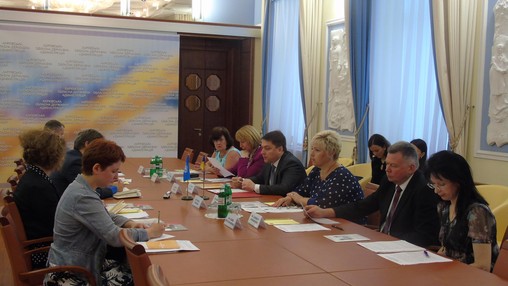Humanitarian assistance will also be provided to internally displaced persons and vulnerable population in Donetsk, Luhansk, Kharkiv, Dnipropetrovsk and Zaporizhzhia regions
Improving the coordination of humanitarian assistance, countering gender-based violence (GBV) and ensuring the effective interaction between organizations and stakeholders in the region to resolve these issues – these topics were discussed at the meeting of UNFPA representatives with Vadym Glushko, Acting Deputy Chairman of Kharkiv State Regional Administrationon September 8.
Vadym Glushko noted that due to ongoing situation in Donbas, Kharkiv region has to solve problems of IDPs everyday.
"There are about 188 thousand IDPs in Kharkiv region to date. I cannot keep silent about the fact that the issues of accommodation and medical care for these people requires assistance from local budgets. Around UAH 200 million will be spent from local budget in order to fulfil these needs till the end of this year "- said Acting Deputy Chairman of Kharkiv State Regional Administration. Representatives of Departments of Social Services, Health, Youth and Sports, Science and Education informed members of UNFPA surge mission about provided support to IDPs. In particular, experts announced the establishment of "Coordination Council for Family, Gender Equality, Demographic Development, Prevention of Gender-Based Violence and Human Trafficking" by Kharkiv State Administration. Vadym Glushko performs as a Head of the Coordination Council. The formation of Working Group to the Coordination Council was suggested with membership of local authorities and public representatives to efficiently and promptly address the issues of gender violence, as well as coordinate the cooperation among service providers. This proposition was addressed to the Chairman of the Board of the Coordination Council bySergiy Veligodsky, UNFPA GBV Field Monitoring Specialist in Kharkiv.
Markus Behrend, UNFPA Representative in Nicaragua and Senior Emergency Coordinator for Ukraine said the UNFPA has developed a humanitarian project that would be implemented in five Ukrainian regions: Dnipropetrovsk, Zaporizzia, Kharkiv and government-controlled areas in Luhansk and Donetsk regions. The budget of this project is about one and a half million USD.
In general, as emphasized by Markus Behrend, these resources will be used to provide people in need with medicines, personal hygiene products and other expendable materials.
Sonja Tanevska, UNFPA Representative Assistant in Macedonia and Surge Reproductive Health Specialist for Ukraine recalled that in July the UNFPA in Ukraine handed over 39 obstetric- gynecology care kits for IDPs currently living in Kharkiv region, worth more than 800 thousand UAH. Humanitarian assistance was delivered to Kharkiv Regional Clinical Hospital, municipal and regional hospitals. According to Ms. Tanevska, such assistance will be provided hereafter.
During September 22-23, UNFPA representatives also held meetings in Kramatorsk, Slovyansk and Severodonetsk, where they discussed the implementation of UNFPA humanitarian project with representatives ofDonetsk and Lugansk regional state administrations, representatives of local medical institutions and local NGOs.
Reference: UNFPA, the United Nations Population Fund, is an international development agency that provides assistance to developing countries with finding solutions for demographic issues.
UNFPA supports countries in improving healthcare programmes, family-planning services, based on individual choice, and developing population policies aimed at supporting sustainable development efforts. Besides, UNFPA works towards better understanding of population challenges, supporting governments to resolve appeared problems with instruments according to the particular needs of every country.



